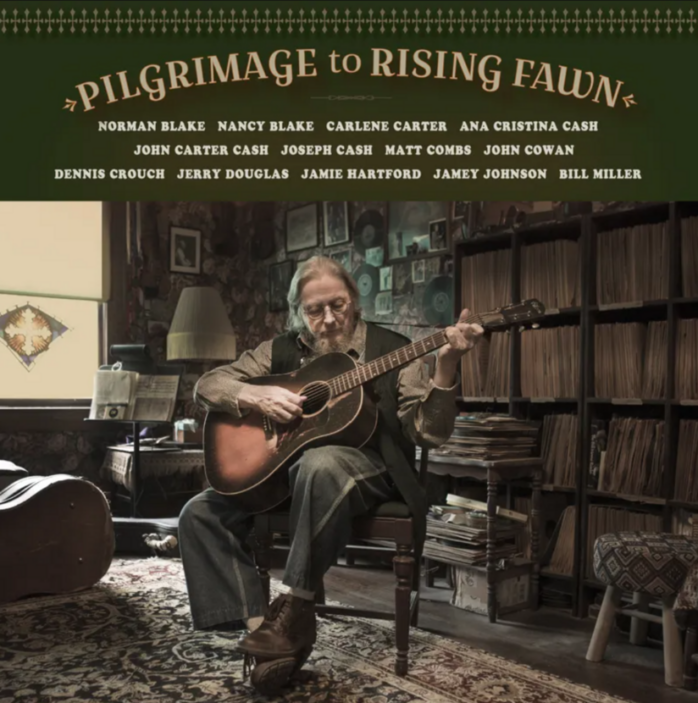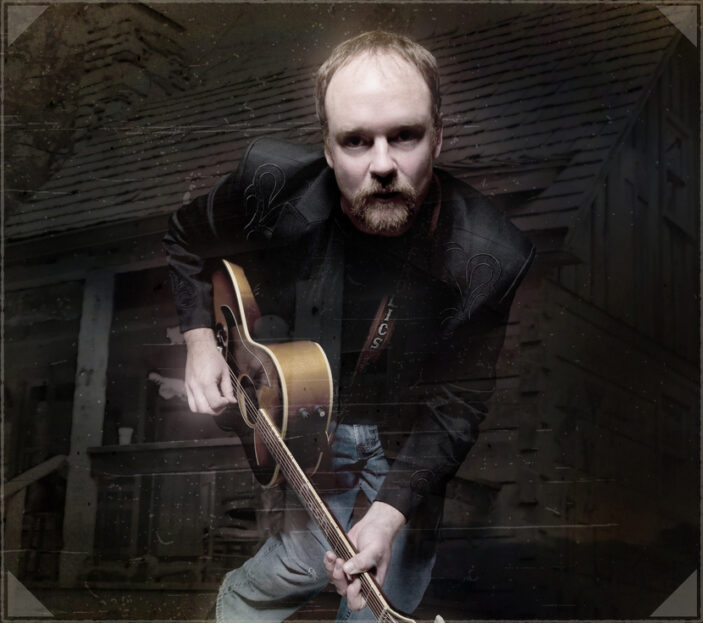
From unflattering comparisons, unassailable legacies and assumptions of unearned success, following in the footsteps of a famous parent likely requires a little bit of masochism. No doubt the privilege, access, and prestige of being the offspring of a Beatle like Julian Lennon or Zak Starkey makes things easier, but the bravery to follow in those footsteps is often to accept living in a dark shadow, in shoes you couldn’t hope to fill much less walk in. No stranger to the challenge is John Carter Cash, the son of musical icons June Carter and the Man in Black himself, Johnny Cash.
With his latest album, Pilgrimage to Rising Fawn out this Friday, Cash utilizes his unique position in country music to assemble a roster of legendary artists from Nancy Blake, Carlene Carter, Jamie Hartford, Matt Combs, Jamey Johnson and several more to celebrate the history of country and bluegrass music. A collection of classic song covers collaboratively built with multiple artists, the album is a tribute to legendary guitarist Norman Blake, whose work is etched into the annals of country and bluegrass music. Recorded entirely within Norman and Nancy Blake’s home in Rising Fawn, Georgia, the album is brimming with the spirt of a southern country abode.

Opening the album with the glamour of a southern barn dance, “Alabama Jubilee” feels like stepping out of a time machine with a whiplash-inducing crash. Fiddles and picked guitars set the stage, while the vocals of award-winning singer/songwriter Jamey Johnson carry into a harmonized chorus. One thing becomes clear: this album will not be the “get drunk, big trucks, solo cups” country that dominates the radio today. Not a knock on countries unbelievable compounding interest of late, but it doesn’t generate the immediate imagery and iconography that that a fiddle and flat picked guitar do. This opener suggests this is not your dad’s country music, or even his dad’s and maybe not even his dad’s country music, but something old and traditional.
Up next is “The Mystery of Life,” featuring Jamie Hartford. A cover of a song from Johnny Cash’s 1991 album of the same name, this version shifts to a heavier bluegrass styling compared to the original. With the guitar taking center stage, it might be country sacrilege to suggest that the pace change improves it over Cash’s original. However, considering this track is an obscure choice outside of Cash die-hards and is hardly synonymous with the Man in Black, I think I’ll escape any furor. The application of modern recording techniques and the refinement of the song’s construction ensure that what’s on offer is more than just copy-pasted covers of earlier works. Though likely not the project’s intention, the reimagining and recording of old songs are reminiscent of the Carter family and their impact on recorded music history. Through the magic of recording, the Carter family popularized many songs that ultimately became what we know now as modern country “standards.” This unintentional coincidence is likely more an idiosyncrasy of the genre where songs are shared and reshaped all the time, but one that’s impossible to ignore.
Following up is “Hi-Eenktum Daddy-O,” a country twist on the nursery rhyme “Go to Sleep My Little Baby.” The song features the folky stylings that have accompanied most of the record so far, with swelling fiddles and a strumming acoustic guitar. Toward the end, the song slides into “Keep on the Sunny Side,” a tune originally written in 1899 by Ada Blenkhorn. Popularized in 1928 by the Carter Family, this duet by Ana Cristina Cash and John Carter Cash is a delightful nod to a shared history.
Another deep dive into history is “Shady Grove,” sung by Jamie Hartford. Probably known best outside of the US by Jerry Garcia’s 1996 acoustic version from the album of the same name, this moody standard, originally from Kentucky, dates back to the early 1900s. This version soars higher than it has any right to for a song that sounds like a sea shanty and existed before the Titanic was built. A strong vocal performance by Hartford and the marriage of slick acoustic guitar, fiddle, and mandolin make “Shady Grove” a particular delight, with the mood shift welcomed at this point in the album. With tough competition, this version ranks among the best, which may be a bias imbued by the modern recording practices that make it sing.
The track “Uncle Noah’s Ark” is a candid, impromptu recording of Norman Blake as he’s gently jeered and peer-pressured into singing and playing the song from the film The Phantom Empire (1935) originally by Gene Autry and Smiley Burnette in the studio. An improvement to the cover by The Wiggles, Blake’s voice is old and weathered which is to be expected for someone born before World War II, but his guitar playing contradicts the cracks and shakes in his voice. It’s a nice reminder that despite the age of Blake, his guitar playing has an indominable spirit and youthful exuberance that defies his years and refuses to be burdened by the passing of time. The song is also a nice tie in with earlier track “The Mystery of Life” which mentions “When I was young, I had Gene Autry guns“.

Up next is “Give My Love to Rose”, a track originally recorded at Sun Records in 1957 by Johnny Cash. The song follows a released convict on his way to Louisiana from San Francisco to see his family. Suffering from a terminal illness, he collapses on a railway track. With his dying words he asks the song’s narrator to carry a message to his wife and son. This one has Joe Cash on the vocals, and sadly lacks much of the charisma and depth that Cash provides on the original. This is largely in part to Joe’s lackadaisical almost bored delivery. Johnny Cash’s original carries in a similar fashion, but the deep grit in his voice carries it much further. This is the first time on the album I feel a version is weaker than one’s before it. The song does remind me of the leeway country and western music is given to have such cinematic storytelling. If you can get over the “twang”, so many of these old classics are simply fantastic stories and updating them for modern ears is such a fun novelty.
“Life’s Railway to Heaven” follows with Carlene Carter and John Carter Cash on vocals. The song was originally a hymn written by Baptist preacher M.E. Abbey and set to music by Charles Tillman In 1890. Another bouncy, fiddle and guitar styled song with some slide guitar on top, there isn’t much more here than what’s been offered already. For the country enthusiast, the joy of Carlene Carter and John Carter Cash sharing vocals over a song that inspired southern gospel music however, is pretty cool. The pair also give it their all with individual flair which is nice.
Opening with the slide of an acoustic guitar, “Howard Hughes Blues” is up next sung by Jamie Hartford. This is a tune that feels like it’s missing from the Fallout video game soundtrack. A rather funny send up of the eccentric millionaire who was known for holing up in Las Vegas hotels (and even buying the whole hotel when they tried to evict him), the song is also a throwback with Jamie Hartford’s father John Hartford having recorded the song in 1972 and as a long time collaborator with Norman Blake. Musically there isn’t much more to write home about, with some super fun country stylings which is something expected at this point in the album. The delivery from Jamie however is quite special and adds a level of comedic attitude to the already quite comedic song that makes it pop.
Closing the 10 song run of the album is “Georgia On My Mind” featuring Jamey Johnson. A more classically styled acoustic and vocal performance, the swelling violin over the heavy country vocals are a sweet touch. A monumental task to outdo Ray Charles, this of course falls short of that task. Then again, it’s clearly not trying to either. A solid homage with a pure old school country soul makes this one a highlight of album. The guitar work in this one is subtle, but incredibly beautiful too. In concert with the strings, it makes for a unique interpretation of this song
Pilgrimage to Rising Fawn is difficult to review objectively and assign a rating to. It serves as something of a history lesson in country, western, and folk music, with a rotating cast of iconic characters, but isn’t an original album per se. Like a strange meta experience, the next generation of Cash and Carters reviving country standards with modern tweaks is reminiscent of both the genre’s roots and their families legacy of recording. For some, it will feel like resting into a well worn leather couch with a time earnt groove custom made for comfort and nostalgia. For others, its probably closer to an iron maiden.
The presence of musical descendants across the album with legendary players like Norman Blake tinge the album with these layers of legacy and tradition, highlighting the ongoing influence of their legendary forebears. It doesn’t live or die by nostalgia either, serving more as a restoration of an antique that reveals the craftsmanship lost to time and wear. It’s also a reminder that while music evolves, its roots remain deeply embedded in the past, continuously shaping the present and future.
In essence, Pilgrimage to Rising Fawn isn’t just an album; it’s a heartfelt tribute to the enduring spirit of country music, celebrating its rich history while also looking forward. If you’re a modern country person, this might not be for you. The musical historian however will struggle to remove the smile from their face. The blending of past and present, coupled with the genuine warmth and camaraderie evident in the recordings, makes this album a unique and valuable addition to any country music collection.
![]()
![]()
![]()
![]()
![]()
FOUR STARS (OUT OF FIVE)
Pilgrimage to Rising Fawn is out today. Grab it HERE
